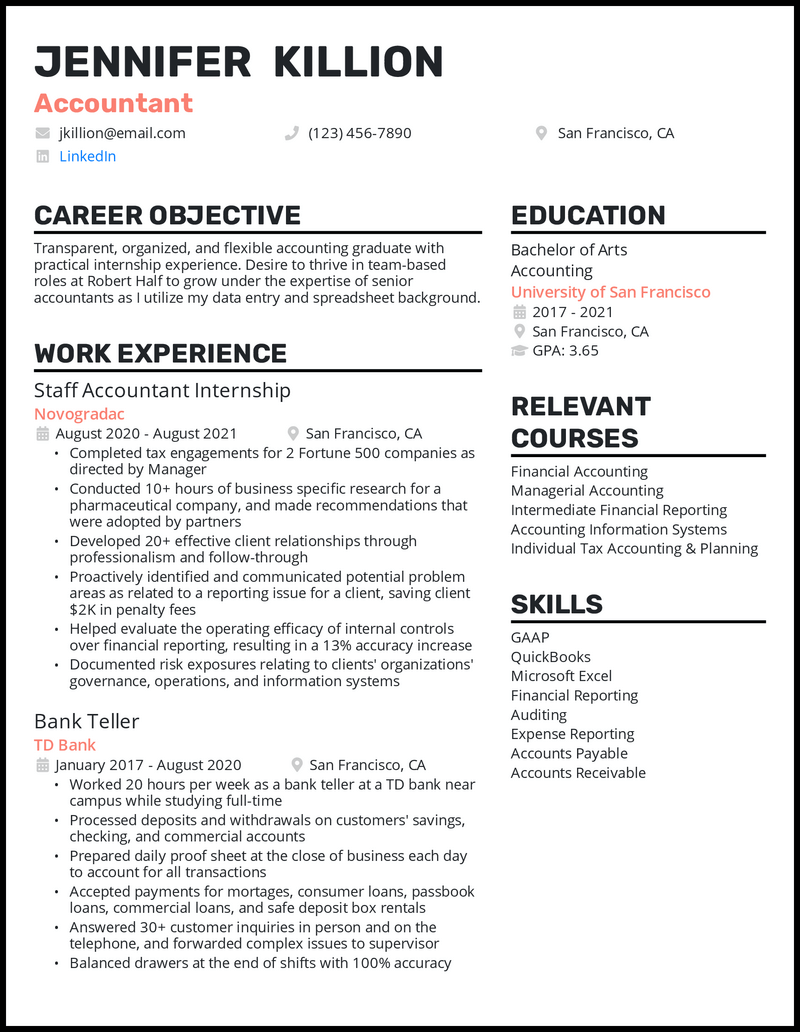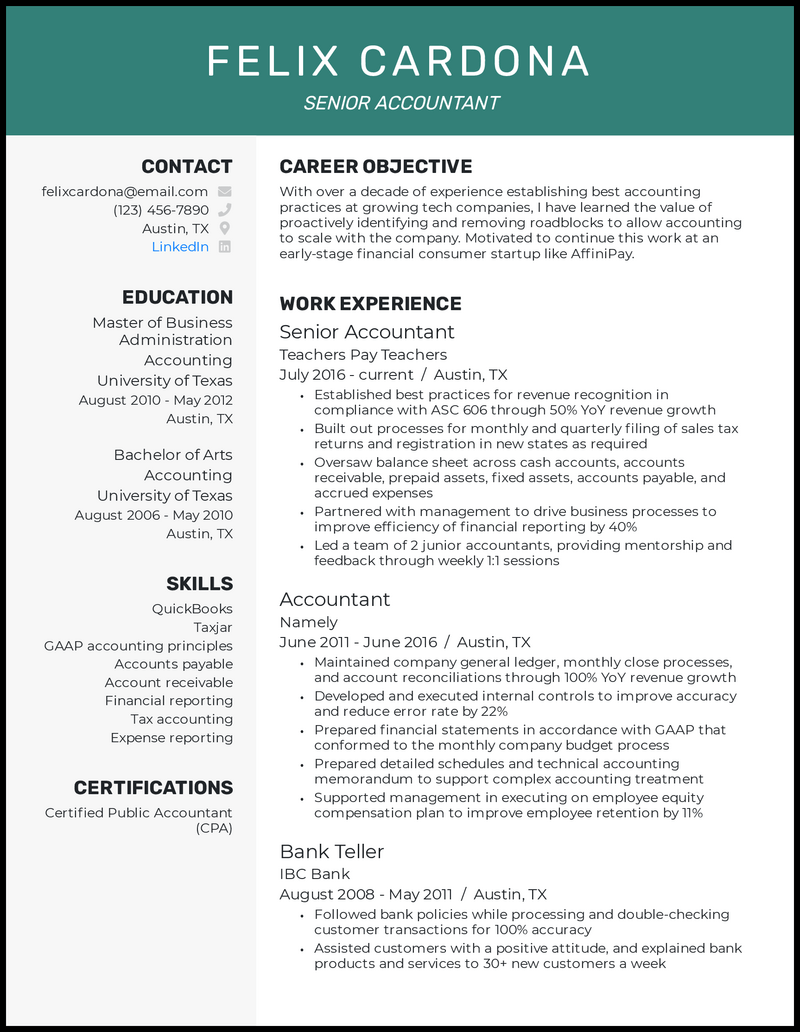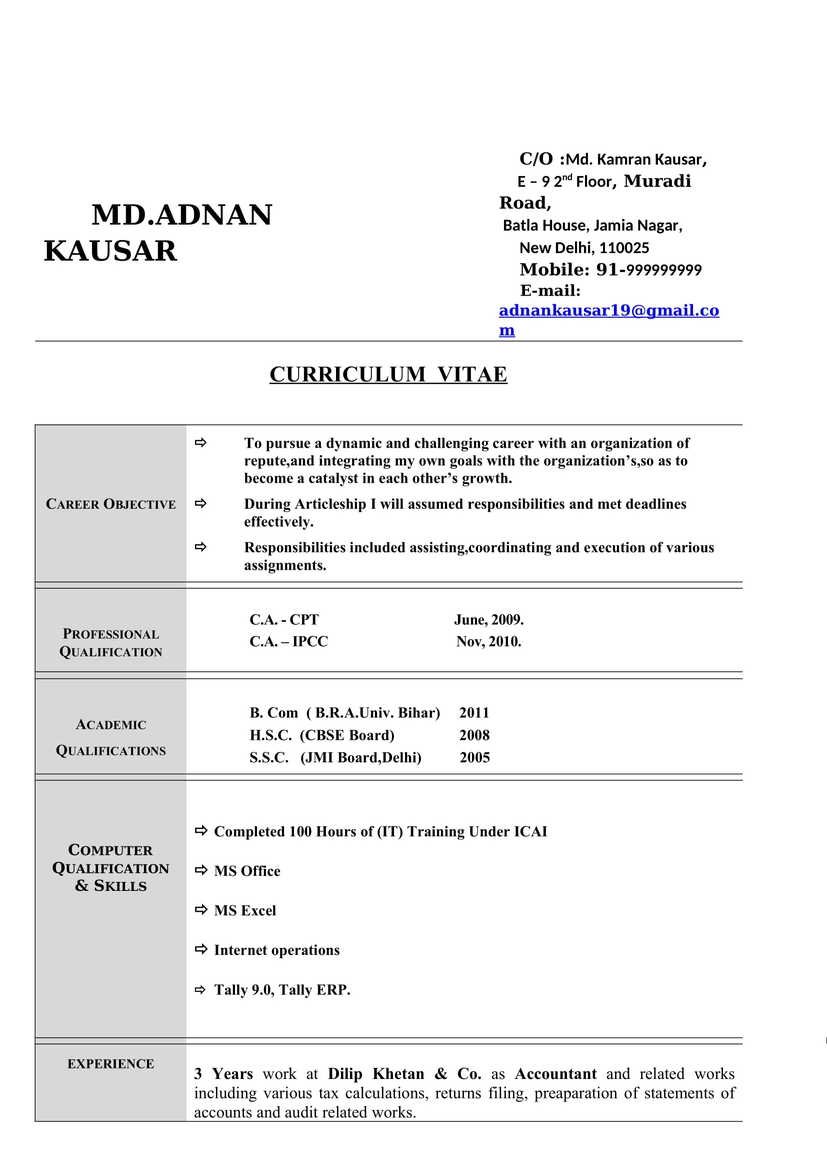
Build my resume
- Build a better resume in minutes
- Resume examples
- 2,000+ examples that work in 2024
- Resume templates
- Free templates for all levels
- Cover letters
- Cover letter generator
- It's like magic, we promise
- Cover letter examples
- Free downloads in Word & Docs

26 Accountant Resume Examples That Worked in 2025
Accountant Resume
- Accountant Resumes by Experience
- Accountant Resumes by Role
Writing Your Accountant Resume
A business is only as valuable as its finances, so successful organizations are built on a foundation of solid accounting practices. To be a successful accountant, you need to be diligent, organized, and an expert with numbers and financial data.
However, to get a role as an accountant, you need to rely on a completely different skill set: resume writing . (And let’s not forget about cover letter writing! )
That’s where we come in. We’ve reviewed countless accountant resumes, distilling what works and what doesn’t into 26 accountant resume examples that you can use to help you get your next accounting job in 2025!
or download as PDF

Why this resume works
- Our special tip: avoid any images or graphics. Before a recruiter or hiring manager looks at your resume, a computer scans it for keywords, and graphics are hard for software to read.
- We’d also recommend putting your experience in reverse-chronological order. By putting your most recent job first, employers will see how you’ve progressed in your career.
- Include the name of the company you’re applying to, the position you’re seeking, and what you hope to achieve in your next role.
Accounting Intern Resume

- When you lack paid work experience, use relevant academic or personal projects to showcase your skills, passion, and capabilities.
Accounting Assistant Resume

- In this resume, the candidate carried out a simulated audit of a fictional company and showcased multiple skills that will help them be a better accounting assistant. If you have similar experiences to talk about, you want to add them to your accounting assistant resume .
Entry-Level Accountant Resume

- Because of your limited background in accounting, don’t worry about trying to extend or fluff your minimal experience.
- Instead, list any work experience and highlight transferrable skills , like written communication, data analysis, and research.
- Try following a resume outline to help you organize your thoughts and ensure you’ve put everything you need onto a single sheet of paper.
- Once you’ve completed the outline, you can use a resume template to format your content correctly and make it look great, too.
Junior Cost Accountant Resume

- Using a resume objective can be a great decision if you’re having trouble filling the page or trying to provide hiring managers with more context as to why you want the job.
- But please be cautious and double-check your resume before submitting an application!
- Imagine submitting your resume for a position at Instacart and realizing you left the name of another target company in your resume objective. Facepalm anyone?
Junior Accountant Resume

- A ChatGPT resume builder can help you highlight your past accomplishments in any roles or projects that are related to finance or show your knowledge/ability to use an accounting tool. Personalize the objective as much as possible to convey why you’re so passionate about getting hired!
Senior Accountant Resume

- You can further support your work by adding metrics to show how you’ve helped the company , especially when it comes to revenue.
- But remember that even a spellcheck system misses things, so ask a colleague to review your resume! You’ll be amazed at what they’ll catch before you turn in your application.
Fixed Asset Accountant Resume

- Kairos, for instance, slaps a certifications section right under their skills to put their Certified Public Accountant (CPA) license in the limelight. Its purpose? To set them apart from the rest of the stack while showcasing their devotion to building their knowledge base.
Revenue Accountant Resume

- You see, action words (think managed, utilized, and supervised) live up to the hype. They spotlight your capability to take charge and paint a clearer picture of precisely what you did in each role. And the best part? They hook the hiring manager, compelling them to read on and see why you’re the puzzle piece they have been looking for.
General Ledger Accountant Resume

- In your general ledger accountant resume, use a credible title such as “Certified Management Accountant (CMA).” Not only does this convey that you’re better than the average accountant in creating reports, but it also shows your dedication to the career at an early stage.
Project Accountant Resume

- Ready to move your resume from the backlog to the done folder? First, let’s embellish it – use a different color to distinguish the header, and then choose a larger and legible font for section subheadings. You can even bolden them to improve visibility and make the resume easier to scan.
Senior Tax Accountant Resume

- For your work history section, use numbers (and percentages, too) to back up your vast experience as a senior tax accountant. Take a look at how Kevin capitalizes on this strategy – Directing a team of six in conducting in-depth analysis…, …reducing errors by 12%, and improving financial reporting accuracy to a rating of 9 out of 10- effectively presenting himself as an outcome-oriented expert.
Payroll Accountant Resume

- Certificates like Certified Public Accountant (CPA) prove that you possess the necessary financial skills , knowledge, and experience to apply for this role! Don’t be too overconfident though. Ensure you back your certification with performance metrics that depict you as a diligent and hard worker.
Accounting Analyst Resume

- As you tailor your accounting analyst resume hoping to get the job, include your measurable impact in expediting accounts, invoices, and response to ad-hoc request processing times.
Fund Accountant Resume

- Felix’s example is the best answer to that question. Everything is displayed for the recruiting team to see and make a quick decision. Follow this lead to boost the chances of your application sailing through.
Accounting Specialist Resume

Cost Accountant Resume

- What was your impact in similar or related roles? Tap into you quantifiable achievements, such as accuracy rates, reduction in operational expenses, and workflow improvements.
Staff Accountant Resume

- Beyond just your education section, you can include your progress in a resume objective or a resume summary .
- A great way to do this is through the use of action verbs like “owned,” “led,” and “advised.”
- It’s also a good idea to show how you’ve made a positive difference in the company. Use metrics to strut your stuff!
- For example, did you increase revenue or efficiency? Discuss it with numbers and percentages that show your impact.
Forensic Accountant Resume

- Unlike a resume objective , a summary statement focuses on leveraging the abilities you’ve learned throughout your career.
- Make sure your summary statement includes your years of experience in accounting and the company to which you’re applying (plus the job title).
- Start by putting your work experience in reverse-chronological order, meaning that your most recent work experience will be listed at the top of the page.
- Then you can consider things like alignment, color, and consistency. Whatever you do, make sure your resume is easy to read at a glance!
Financial Analyst Accountant Resume

- Have you joined or started a group for accountants? Maybe you’ve written a personal finance book? Or perhaps you occasionally discuss financial trends at events outside of work? These are on-point examples of using your skills in unique ways, so they’re perfect resume components.
- Focus on including projects and volunteer experience that can demonstrate essential skills (like collaboration and communication).
- Look for similar structures, word usage, and metrics to see how you can make your resume pop.

Management Accountant Resume

- Make sure that your management accountant resume shows your most relevant experience. Include your most significant accomplishments, like if you’ve led any projects or saved your company a lot of money.
- Although your goal is to show your most relevant work, having a cohesive career progression is more important. Employers want to see that you’ve been consistently working.
- Look for specific skill keywords and responsibilities listed in the job description and incorporate them into your work experience and skills section to make the best impact.
Certified Public Accountant (CPA) Resume

- To keep to a single page, make your bullet points short. Ideally, every point should be one sentence and a maximum of three lines long .
- List accomplishments and achievements by all means, but don’t clutter your space with empty adjectives or adverbs. Words like “successfully” and “as needed” are generally assumed, so leave them out.
- Certifications need their own section, but you don’t need to add much more than the name of your certificate. You can include the organization that offers the certificate, but most hiring managers will know that information already, so don’t stress about it.
Onboarding Accountant Resume

- However, your resume is not your cv . As hard as it is to break up with your old jobs, it’s for the best. The best resumes include just three to six of your most relevant work experience roles.
- Put yourself in the shoes of the hiring team reviewing 100+ resumes. What work experience would stand out and be the most relevant for the position?
- And if you’re worried about forgetting or losing information from your work history that could be relevant later on, don’t sweat it. You can create a separate document with a “master list” of work experience that you can pull from for different jobs.
Accounting Clerk Resume

- Think of the skills section of your resume as a peek into your technical prowess with accounting software. Any tools that help you do your job better are worth adding to this part of your accounting clerk resume .
Tax Accountant Resume

- In this resume example, the candidate’s last job was as a tax accountant—the same position they’re applying to. Putting it at the top highlights what you’ve been able to achieve at your previous job.
Public Accounting Resume

- Do you hold a Certified Public Accountant (CPA) certification? If you’ve completed your CPA, it’s proof that you have a license and the knowledge to provide accounting services to the public.
Related resume guides
- Bank Teller
- Accounts Payable
- Financial Analyst

As an accountant, you know that precision matters. You’re expected to be an analytical expert who can produce reliable research and solve complex legal and financial problems. So, think of your resume not only as a place to highlight your experience but also as a place to demonstrate your attention to detail and high standard of work.
Boosting your resume’s potential requires special attention to these four areas:
- Listing accounting skills
- Formatting your accountant resume properly
- Quantifying your previous impact
- Customizing your resume to each job
List the right accountant skills
When recruiters post an accountant job description , it’s not unheard of for them to receive upwards of 100 resumes. With the sheer number of applicants, companies can’t carefully review every accountant’s application. The applicant tracking system (ATS) software helps weed out applicants before a recruiter reviews them, which saves time and gets rid of candidates without the right experience.
Applicant tracking systems work by using algorithms that match keywords from the company to keywords in your resume. So even if you’re highly qualified for a job, your resume may be thrown out if it doesn’t include the right keywords. To avoid this, you need to know how to include job-appropriate skills on your resume (keywords).
What are the right skills? The right skills will vary depending on the accountant role. Read this excerpt from a sample accountant job description and see if you can pick up on the essential skills:
Greenhill is seeking a certified accountant who can tackle every level of the accounting process, from balancing ledgers to researching the law and analyzing data to ensure efficient and effective operations. This position is ideal for candidates who are jacks of all trades! Must possess strong public speaking and collaboration skills while demonstrating initiative and the capacity to conduct independent work.
Based on this small sample, we can create a list of essential skills customized for the job. You do not want to take exact words from the job description or lie about your skill level . Instead, use the accountant job description as a jumping-off point to think about the most relevant skills you possess:
- Accounting applications: Quickbooks, ERP, Concur, Taxjar
- Tax accounting
- Expense reporting
- State law compliance
- Accounts payable/receivable
- Collaboration and communication
- Data analysis and research presentations
On other accountant job postings, you can expect to see different skills emphasized, such as:

Choose the best resume format
It’s not just about what you write on your accountant resume; it’s about how you write it. Your resume format is important for ensuring that your resume is visually appealing, easy to read, and easy for the ATS to recognize. For these reasons, we always suggest the reverse-chronological format to keep your most recent job experience listed at the top of your resume, but there are some other aspects of resume formatting you need to know.
Here are some other essential elements of resume formatting that you should pay attention to:
- Resume length: Always ensure your resume is a full, single-sided page.
- Bullet points: Break up large text sections about your work experience with classic round bullet points.
- Avoiding icons/images: The ATS does not seem to appreciate icons/images; neither will recruiters.
- Listing the title of the position you’re seeking: Specialize your resume for each job you apply for to show respect and genuine interest in the job. (This is especially useful for a company that may be hiring for multiple positions.)
- Objective/Summary: Only use one when necessary (hang tight—we’re about to cover this in-depth).
Remember these formatting tips, and you’ll be confident that your resume is ATS-friendly and easy to read for recruiters.
Understand the elusive resume objective and summary
All right, back to the objective and summary. A resume objective is one of the most misunderstood sections of your resume. Most people think objectives are outdated and pointless, but that’s only the case if you don’t tailor them and keep them short.
But what exactly is a resume objective? And what’s the difference between that and a resume summary? Let’s dive in!
A resume objective and summary statement are both short, two to three-sentence paragraphs at the top of a resume to express your interest in a position or a brief career synopsis. Both require customization and should be avoided if you don’t plan on writing a new one for every job application.

However, these two types of paragraphs differ in how they communicate interest in the job. An objective describes the value you’ll add to a company and why you want the job . Objectives are best suited to accountants who are just starting their careers or going through a career change (like from a staff accountant to an accounts payable specialist).
A resume summary highlights your past work experience , leveraging it to prove your qualifications and skills . Because the summary relies on many past job experiences, it’s only recommended for senior accountants with many years of industry experience.
Let’s work through a few examples together, so you can better understand all the moving parts:
Poor resume objective: Years of experience in the industry, looking for a full-time job in the accounting field with benefits.
- There are multiple issues at play here. First, it’s uninformative. The applicant doesn’t list anything that provides concrete evidence of their skills. Secondly, it’s not specific. They don’t mention a particular job title, applicable skills, or the company to which they’re applying. Lastly, this candidate is only focused on what the job will do for them . You need to mention why you’ll be an asset to the company, not what the job will provide for you personally.
Better resume objective: Detailed junior accountant with 4+ years of experience working for Big Four accounting firms. Seeking an opportunity as a staff accountant at a smaller-scale operation like Fender Co., where my specializations in optimizing pricing through software adoption and systems streamlining would positively impact sales.
- This resume objective makes the case that the applicant is valuable to the company by highlighting relevant skills and years of experience. Furthermore, it’s customized to the specific job the candidate is seeking, which is a major green flag for employers.
Poor summary statement: Experience as an accountant for 3 businesses. My role, which was providing organized, detailed work for all 3 companies, positively impacted the companies.
- This statement is vague and confusing, not to mention it’s poorly worded. Would you trust this person with your company’s financial accounts?
Better summary statement: Data-driven certified accountant with specialized work in small and mid-size businesses for 22 years. Dedicated to providing services that adhere to GAAP standards while optimizing operations and financial performance. Expertise in many types of accounting software relevant to business size, including Xero, QuickBooks, Zoho, and SAP. Experience supervising and collaborating across cross-functional teams and departments while increasing ROI by 5%+ YTD.
- This summary statement provides specific metrics, specialized skills, and a job title. It’s a great example of a strong statement that would impress a hiring team.
Quantify your positive impact as an accountant
If you want to prove to a company that you’re an excellent accountant, you’ll want to focus on numbers. Quantifying your impact on your accountant resume provides concrete proof that you’re an asset to the company.
Fortunately, as an accountant, there are many ways to quantify your impact, such as:
- Internal company operations: Have you worked with company executives to propose financial incentives to improve employee retention? Have you instituted software adoption that reduced error rates?
- Leadership: Do you manage, mentor, or collaborate with a team? Do you work across several departments?
- Work with vendors: Do you assess vendor invoicing or review vendor statements? Do you manage accounts payable for vendors?
- Clients: How many clients do you advise if you work with individual clients? How long have you retained these clients?
- Revenue: How much revenue does the company you work for generate? How many assets do you oversee? How much have you saved in potential penalty costs?
- Reductions in error rates: Have you reduced errors during employment at your past jobs? Do you use specific types of software to minimize mistakes?
Based on the above, check out these examples that demonstrate how metrics can fuel your bullet points:
- Proactively identified and communicated potential problem areas related to a client’s reporting issue, saving the client $2K+ in penalty fees
- Supported management in executing an employee equity compensation plan to improve employee retention by 11%
- Led a team of 2 junior accountants, providing mentorship and feedback through weekly 1:1 sessions
- Reconciled vendor statements in QuickBooks, investigating and correcting any discrepancies within 48 hours
Optimize your accountant resume for each job
Unfortunately, you can’t just have one copy of your resume that you submit for every accountant job application. Every application deserves a tailored resume.
With the job description in view, these are the areas you’ll need to pay special attention to:
- Objective/summary statement: Remember how we encouraged you to include specific company names? One of an applicant’s worst mistakes is failing to change the company name on multiple job applications. Make sure you read over your statement (if included) before submitting your resume, changing the job title, skills, and company name.
- Skills: To customize your skills section, read the job description. Often, hiring managers will overtly say what skills are important for the specific accounting job (but be careful not to plagiarize).
- Job description bullet points: Are you applying to a job that needs you to interface with clients? Or maybe you’ll be working behind the scenes with data? Think about how you can shift how you discuss your work experience to highlight what’s important for each particular job.
We know it’s frustrating to focus on customizations when you want to submit multiple applications in a short amount of time. Consider creating a document with a master list of job description bullet points and skills, sorted into groups based on the skills you need to highlight (e.g., one section that demonstrates your accuracy, another for client interactions, another for public speaking, etc.). Then, you can pick and pull things from this document to create fully customized resumes in no time.
For now, we think you’ll find something to help you get started on your accountant resume, no matter the exact role:
Accountant resume
- Do you have experience in general ledger (GL) accounting?
- Remember, you don’t need to include all of these accounting skills in each position, but they must be covered at least once somewhere on your accountant resume.
Senior accountant resume
- Underscore things like extensive improvements in efficiency rates, accuracy, and year-to-year financial growth.
- Have you collaborated with upper management to set company-wide standards or implement internal policies or financial work incentives?
- Highlight your ability to step into leadership and mentorship roles.
Accounts payable resume
- Hone in on what matters by discussing payment processing and review, tracking business expenses (such as vendor invoices), and ensuring GL and GAAP compliance.
- Highlight your attention to detail and how it has saved revenue for companies you’ve worked for in the past.
Entry-level accountant resume
- You can leverage almost any job position to highlight particularly relevant skills in accounting. For example, a restaurant server can still balance payments, check receipts against bills, etc.
- Read the job description carefully, noting what skills are most important to the hiring team and emphasizing your capacity to work in accounting based on their requirements.
Staff accountant resume
- Your staff accountant resume should focus on general ledger maintenance/oversight, tax revenue billing, accounts payable/receivable, reports, and general record-keeping.
- Don’t forget to showcase your potential for job advancement down the road by highlighting any aspects in which you provided management/supervisory work.
Final takeaway for improving your accountant resume
The hardest part of writing your accountant resume is getting started, so congratulate yourself on starting your resume journey! You’re one step closer to creating your best-ever accounting resume. We’ve laid out all the essential tips, including optimizing your skills section, formatting, metrics, and resume customizations, so you can write an amazing resume in no time.
We also have a host of tools to make resume writing easier. See how your resume stacks up against our AI-powered tips. Or, if it’s time to write your resume for the first time, you can use our resume builder with built-in formatting standards and corresponding recommendations to keep the process stress-free, easy, and quick—leaving you time also to craft a killer accountant cover letter for your dream role.
No matter what stage you’re at, we’re here to help, and we wish you the best of success!


20+ ACCOUNTANT Resume CV Format in Word (.docx) FREE DOWNLOAD
Download free accountant resume templates in Word (.docx) format. These templates are easy to use and perfect for creating a professional resume. Designed for all levels of accounting jobs, they highlight your skills and experience effectively. Download now and make a great first impression!

✪ DOWNLOAD IN WORD

Creating a standout resume is the first step toward securing your dream accounting job. With our collection of free accountant resume templates in Word (.docx), you can effortlessly showcase your skills, experience, and professional achievements. Whether you’re applying for a role in India, the UAE, Australia, or anywhere else, these templates are designed to suit various accounting positions, from entry-level to director roles.
Tailored for different needs, these resumes cover essential elements like job objectives, experience, summaries, and more, ensuring you present yourself effectively. Download your preferred format, customize it, and confidently step into your next opportunity. Don’t wait—grab these free templates today and take a big leap toward career success!

Nazim Khan (Author) 📞 +91 9536250020 [MBA in Finance]
Nazim Khan is an expert in Microsoft Excel. He teaches people how to use it better. He has been doing this for more than ten years. He is running this website (TechGuruPlus.com) and a YouTube channel called "Business Excel" since 2016. He shares useful tips from his own experiences to help others improve their Excel skills and careers.

7 thoughts on “20+ ACCOUNTANT Resume CV Format in Word (.docx) FREE DOWNLOAD”
I love ur cvs
Thanks buddy, more Templates coming soon
Please send me Chief Accountant CV format
This is a great resume format for an accountant. It is well-organized and easy to read.
very help full resume in word format so nice of you thanks
You are welcome buddy.
resume format provide
Leave a Comment Cancel reply
Save my name, email, and website in this browser for the next time I comment.
Notify me of new posts by email.

IMAGES
VIDEO